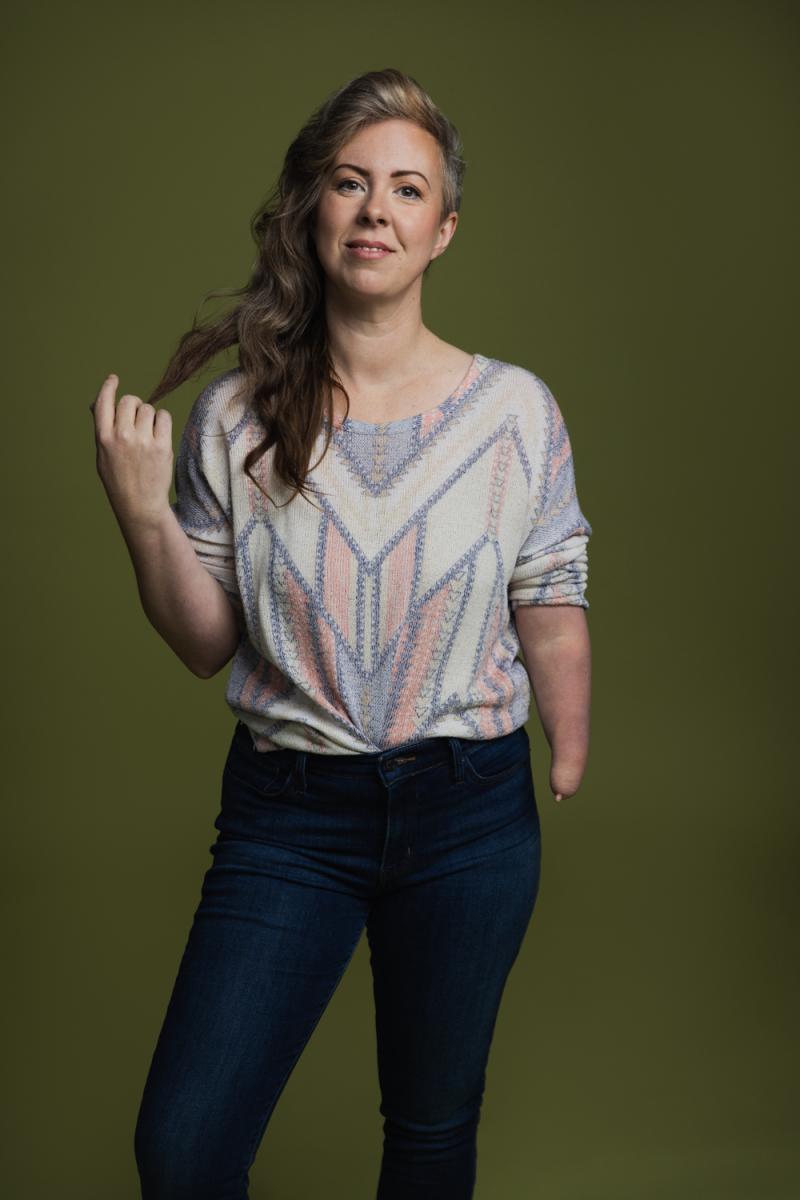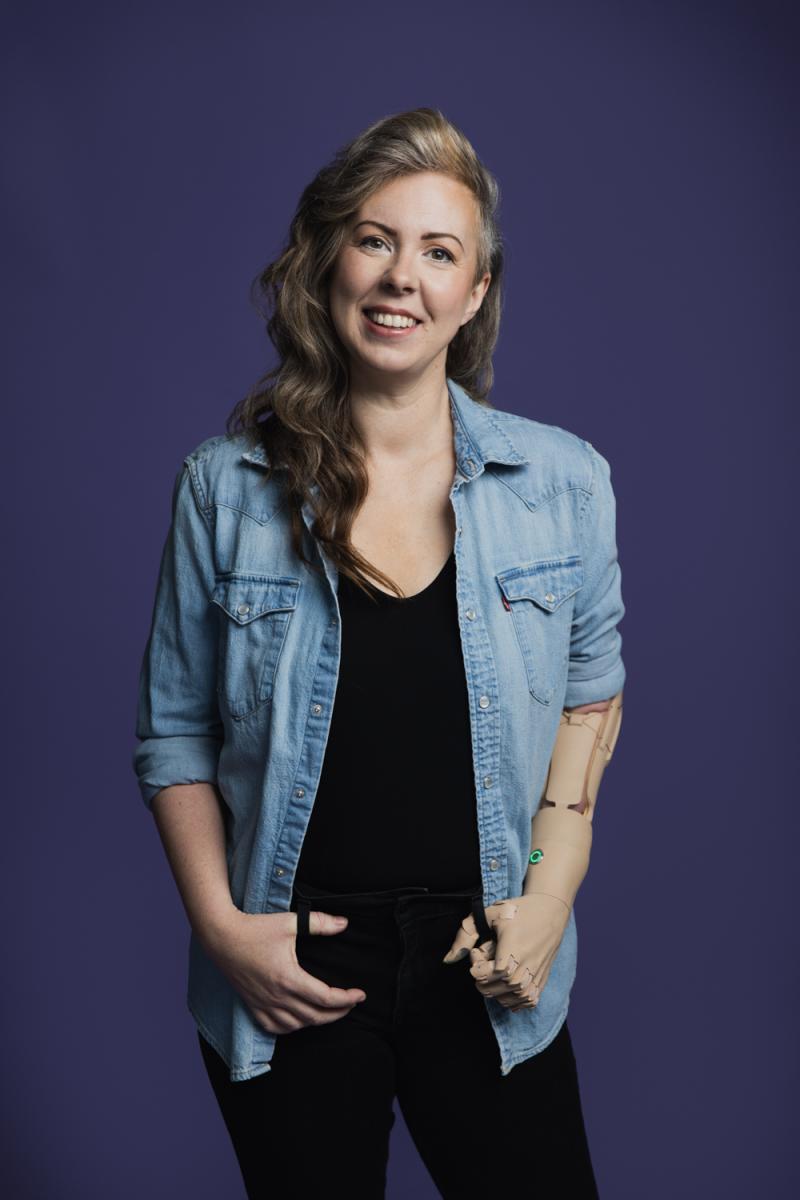Elena Orde speaks to Alexis Hillyard from YouTube channel Stump Kitchen about vegan and gluten-free cooking, body diversity and accessibility.
Tell me about your vegan journey and how you got into cooking.
I’ve been vegetarian probably since I was about 19. I was inspired by my little sister. And then a few years ago my partner really inspired me to give it a try. I don’t even know why I didn’t do it earlier, but as soon as I switched my body felt so incredible. I was reading more about the environmental impact, and I was always into animal rights, so it seemed like a logical move.
I also have a gluten intolerance, so I really had to learn how to cook for myself. I was nervous to do it because I hadn’t cooked much, but I started off with some simple recipes and just went slowly. That’s when I started to feel the joy of cooking – smelling the ingredients and using my stump as a tool, like a spatula and a juicer – it was just very embodying and freeing for me. My whole vegan journey is centered around this really cool new discovery of body love and being present in the kitchen.
How did Stump Kitchen come about?
I wanted to educate more people on how you can have a really fun and delicious gluten-free and vegan diet it doesn’t need to be a lot of work. My partner was really encouraging. She actually helped me film my first few episodes, just on her phone.
When I first started making videos I was also dealing with a bunch of mental health issues, and experiencing depression for the first time. Filming and editing videos actually became a really neat healing tool for myself.
When I first got my footage back and was watching myself on screen, I realised I was seeing myself at the most happy that I had been in a long time. Depression is stupid like that – it takes away all the joy and makes it so you can’t remember it – but I had this visual representation of watching myself being so happy and embodied and so the more I edited and the more I filmed, the more I could see that. It carved a new space for my happiness and it gave me a beautiful tool of resilience to get me through the hardest parts of my depression.
Did you immediately feel comfortable on camera?
Honestly, on day one I felt extremely comfortable. I think it was because I didn’t have any thoughts about how many people might watch it. It was just me and my partner in the kitchen and eventually it was just me, and so it was very easy to be myself in front of the camera and just have fun, or if I had a guest with me it was about our interaction. It was always just a lovely experience to have the camera capturing the joy that was happening.
When I started I was in a place in my life when I was defying a lot of societal expectations – I didn’t like wearing a bra and I didn’t like wearing make up, and I have armpit hair, so I was starting to do more of those things that you’re not really “supposed to do”. So being able to be myself also felt authentic and empowering, and that made me less nervous.
What are your thoughts on the intersection between veganism and physical difference?
difference?
I think having representation in veganism is so important, and having people with diverse bodies is just as important as having more folks of colour and other people showing that veganism isn’t just for privileged white folk.
Mainly what I do with my show is to make veganism accessible – I want people to see it as another beautiful option that doesn’t push people away, like some of the vegans have done before us. It’s about being respectful and doing kind activism so people are like – “Aw yeah, I can try that!”
What kind of advice might you have for people to appreciate or celebrate physical difference of their own or other people?
One of the main differences that can be upsetting is the assumption of inability. I think one of the greatest gifts that anyone can do for people who are different is giving them the benefit of the doubt and not assuming they need help or that they can’t do something. Letting them be autonomous individuals and knowing that they might do something differently, they might do something more slowly – they may need help here and there, but they will ask for that.
I have a friend who is blind, and one day when he was at a bus stop someone said to him, “Wow, good for you for going outside”. In his head he was like, “I’m going to my job, I’m a lawyer.” He has such a rich a beautiful life, but the perception is that there is such a lack of ability to have a normal fulfilled life.
I think doing work on ourselves and our own assumptions around disabilities is the most beautiful thing you can for anyone you meet. When I meet people most of the time, people are so great. But once in a while, you get somebody who is like, “I’m going to pray for you, it must be so hard for you to find a husband.” And I’m just like, first of all I’m gay, second of all go away. But I think doing your own inner work and examining your own assumptions about difference and disabilities is the most incredible gift you can give to the world.
Have you always loved your body and been at peace with your body image?
There have been a couple times in my life where I was quite angry that I was born like this, with one hand. Very rarely though. There was a time in junior high where I saw a video of myself doing a dance choreography and then I realised how different I looked and I got really angry and I cried with my mom. But it was like 24 hours of horrid sadness, then I was fine.
Later in life, leading to my depression diagnosis my sister recalled I had a track of time where I used to hide my arm. Which is so unlike me, but I think my mental health affected everything about me and how I perceive myself. I would hide it or make little comments like, “Oh no I can’t, because I have one hand.” Things that I just don’t say. I think it was a dark time for me anyway, but I think those two times were the worst.
Otherwise, I had a great upbringing. My parents were so good – they helped me practice what to say to people about my hand. I felt very prepared. My baby sister loved my arm and she would play with it when we were little, so I was lucky to have a sense of body awareness and body love from the very beginning.
What are your plans for Stump Kitchen going forwards?
More of the same! More cooking, more meeting people, more joy. I’d like to do more collaborations on my channel, with vegans and people with limb differences. I’d like to travel and take Stump Kitchen further afield, but that depends on my resources. And maybe in the future when I retire from YouTube, I’d like to set up a restaurant. But right now, I feel very lucky doing what I do.
Follow Stump Kitchen on YouTube, Instagram, Facebook and Twitter, and visit the Stump Kitchen website to support and find out more.
This article was first published in our membership magazine The Vegan Issue 1 2020.
Are you enjoying this blog? Then why not join The Vegan Society as a member! From just £2 per month, you will get access to our quarterly magazine, The Vegan, receive over 100 discounts, exclusive competitions and more! To become a member or find out more information, please visit our Join Now page.
The views expressed by our bloggers are not necessarily the views of The Vegan Society.

